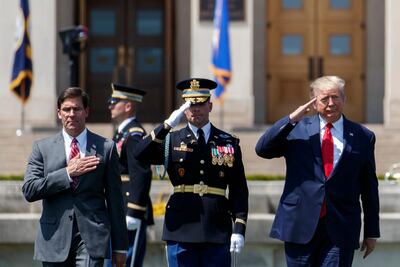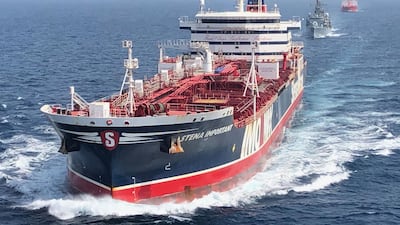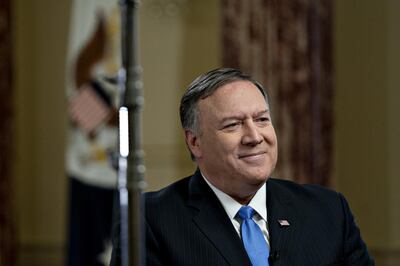The United States is rallying allies to create an international security force to protect shipping from the threat posed by Iran in the Strait of Hormuz, as the British navy began escorting UK-flagged ships through the waterway after the seizure an oil tanker by Iranian forces last week.
US Secretary of State Mike Pompeo said Japan, France, Germany, South Korea, Australia and other nations had already been approached to join the security initiative.
"Every country that has an interest in ensuring that those waterways are open and crude oil and other products can flow through the Strait of Hormuz needs to participate," Mr Pompeo said in an interview on Fox News on Thursday.
The US initiative follows recent attacks on vessels in the area that Washington has blamed on Iran. The two countries are in an increasingly tense stand-off over US sanctions that seek to cut off Iran's vital oil exports.
Mr Pompeo said in earlier interview with Bloomberg TV that he would be willing to travel to Iran for talks on the current crisis. Tensions have been building since the US pulled out of a 2015 international accord with Iran to curb its nuclear programme, and re-imposed sanctions that had been lifted as part of the agreement.
"Sure. If that's the call, I'd happily go there," Mr Pompeo said. "I would welcome the chance to speak directly to the Iranian people."
Iran has rejected US offers to renegotiate the deal while under the pressure of sanctions and has demanded that the European signatories, including Britain, find ways to restore its access to global markets.
Britain angered Iran with the seizure of a loaded Iranian tanker off its Mediterranean territory of Gibraltar this month on suspicion that it was carrying oil to Syria in violation of EU sanctions. The seizure of the British-flagged oil tanker Stena Impera in Omani waters by Iran's Revolutionary Guard on July 19 was seen as a retaliation by Tehran.
In response, the British government announced on Thursday that its navy had begun escorting vessels through the Strait of Hormuz, despite saying earlier that it did not have the capacity to do so.
"The Royal Navy has been tasked to accompany British-flagged ships through the Strait of Hormuz, either individually or in groups, should sufficient notice be given of their passage," a government spokesperson said.
“Freedom of navigation is crucial for the global trading system and world economy, and we will do all we can to defend it.”
Also on Thursday, the US Central Command hosted an international meeting in Tampa, Florida, to discuss security for shipping in the Middle East.
The meeting at MacDill Air Force Base was attended by the UAE among other countries, including Britain and European nations, The National has learned.
A UAE tanker was among four attacked in Fujairah port in May, while two others were hit by explosions weeks later after passing through the Strait of Hormuz.
Centcom spokesman Major John Rigsbee told The National the meeting was attended by "senior representatives from allies and partner nations" but declined to name the countries taking part.
He said the security initiative, dubbed "Operation Sentinel", was designed "to enhance maritime domain awareness and promote maritime stability in response to recent events in the Arabian Gulf region".

In the absence of a formal coalition, each country is responsible for protecting its shipping in the region, according to newly confirmed US Defence Secretary Mark Esper.
“The Brits are escorting their ships and we will escort our ships, and I assume other countries will escort their ships,” he said on Wednesday.
But Mr Esper said that the US, with its superior naval fleets, would "come to the aid of our allies, depending on the situation".
Centcom's meeting on Thursday was the third hosted by the US administration since the standoff with Iran began. Besides the targeting of shipping, tensions have been raised by Iran's downing of a US surveillance drone in the Strait of Hormuz that almost led to retaliatory US strikes before President Donald Trump called them off at the last moment.
In another apparent provocation, Iran reportedly test fired a ballistic missile that travelled 1,000 kilometres on Thursday.
A Pentagon official told CNN the Shahab-3 missile did not pose a threat to shipping or US bases in the region.
Mr Trump cited the failure of the 2015 nuclear accord to curb Iran's missile development as one of the reasons for pulling the US out of the deal in May last year.


